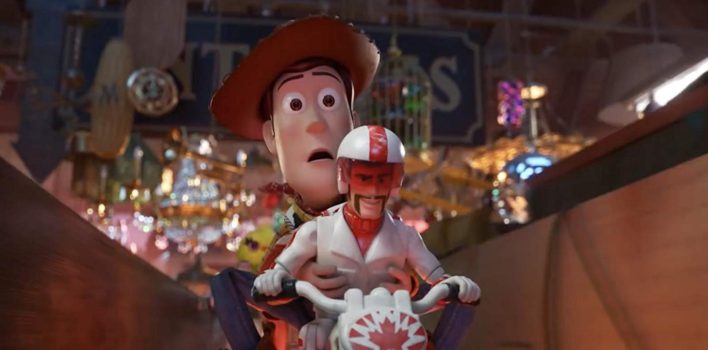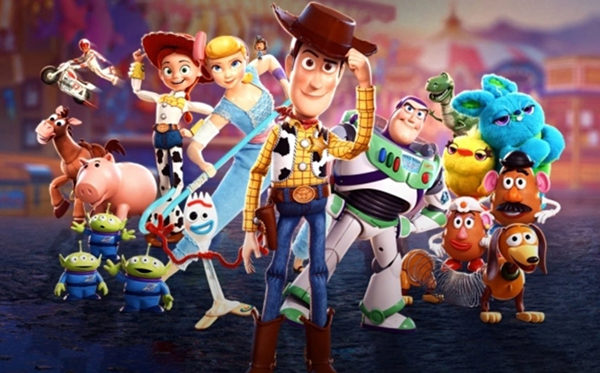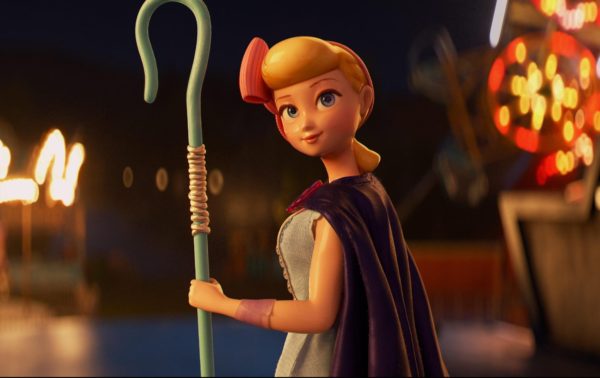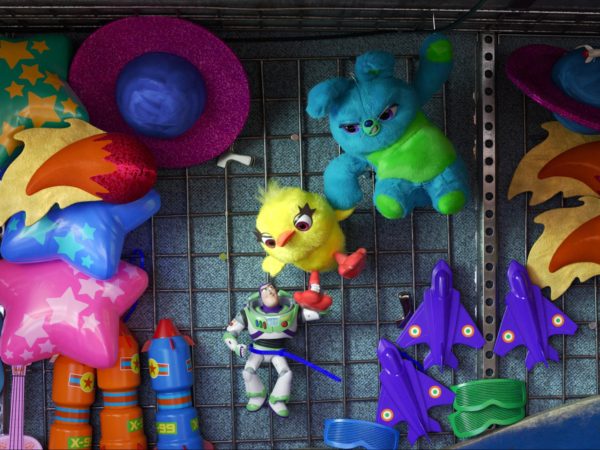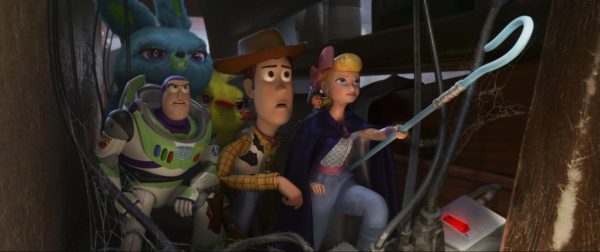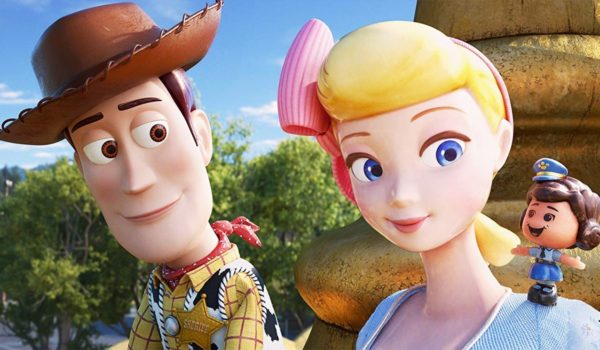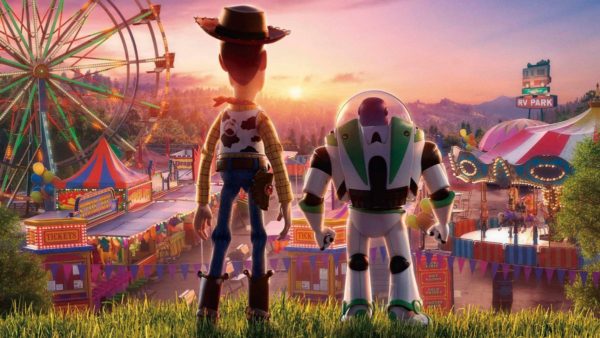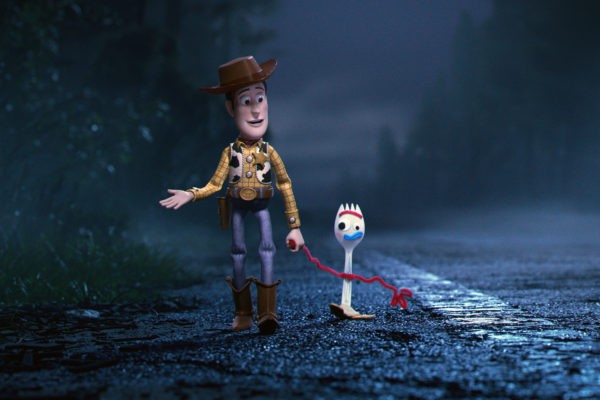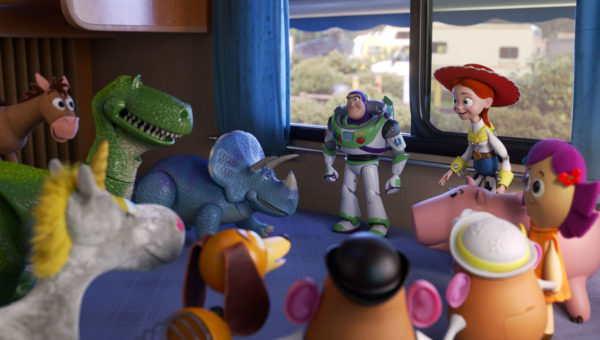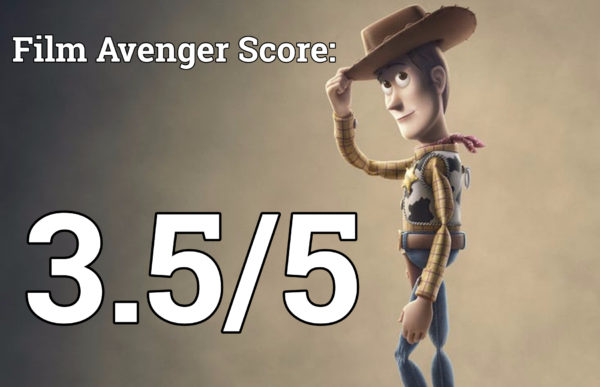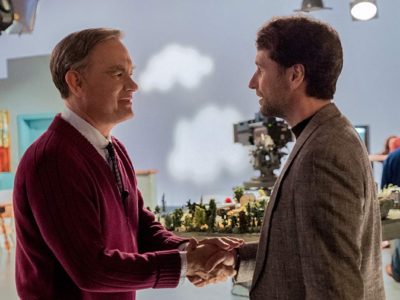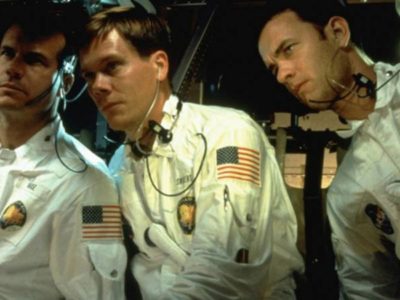Review| Toy Story 4: A Purpose-Driven Plaything
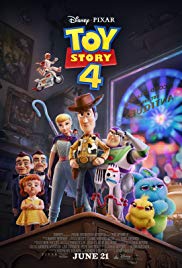
There have been few movie series so perfectly ended as Toy Story. The third entry tied up all the loose ends, pulled our heartstrings almost to the breaking point, and left all our favorite characters in a great spot where they would be taken care of and happy.
But I suppose that, given how well Toy Story 3 fared at the box office, there was no way Pixar and Disney would leave that money-making potential alone. There would eventually be a fourth entry in this venerable series. And now, it’s here.
Toy Story 4 reunited us with all our friends that we’ve grown to love in the past 25 years on a new adventure that indeed had its moments that were genuine and heartfelt. But ultimately, this movie seemed unnecessary and even hindered the legacy of the previous films. Perhaps Pixar should have left well enough alone.
Despite its superfluousness, Toy Story 4 had a strong thematic core to it that was very deep. It was one of the deepest Pixar films to date, with questions about the very nature of existence and what we are here to accomplish. Thankfully, we have a Creator who has a plan for each and every one of us.
SPOILERS AHEAD
The Good: The Toys are Back in Town
By itself, Toy Story 4 was a well-made film. It was truly nice to see all these wonderful characters back in another adventure. For the most part, they all retained their charm. I could tell that the crew, including director Josh Cooley, love these characters and took special care to carry on the legacy of the franchise. The art direction matched the previous films very well and created a seamless visual continuity, which is always appreciated.
With every film added to their canon, Pixar improves their animation techniques and Toy Story 4 was no exception. The character animation was phenomenal. The faces are even more expressive and the action is more fluid and realistic. Given their legacy, watching the Toy Story films is almost like watching the evolution of computer animation at Pixar.
The voice cast of Toy Story 4 continued the series’ amazing work. All of the veterans like Tom Hanks and Tim Allen turned in great performances full of emotion and pathos. I also admired the creative team’s effort to include the late Don Rickles in the film as Mr. Potato Head using outtakes from the previous films and other Toy Story projects. The newcomers like Christina Hendricks and Tony Hale also delivered stellar voice work. The latter in particular was great as Forky, the existentially-challenged spork-turned-toy.
Hendricks’ Gabby Gabby was a truly sympathetic villain with an exceptionally well-executed turn toward the end of the film that just made my heart melt. The scene where Gabby goes to comfort the lost little girl in the carnival was one of the best emotional scenes Pixar has ever done, and it gave Gabby a wonderful end to her arc in the story.
But the VIP voice actor for this film is definitely Keanu Reeves as the hapless Duke Caboom. Reeves gave Caboom a hilarious insecurity that immediately endeared the character to the audience. That and Reeves put a lot of effort into not sounding like his usual “whoa” self. Truly exceptional.
My biggest fear about this film was the transformation of Bo Peep. It seemed that based on the marketing and merchandise push, she was going to be turned from a sweet, confident, level-headed complement to Woody into a contrived, paper-thin, overly-confident woke feminist icon.
I’m so glad my assumptions were incorrect. Bo Peep, once again voiced by Annie Potts, went through a transformation that felt organic—serving the story and the character well without being a megaphone for the creators’ politics. She’s lived on her own for years and has had to rely on her wits and her sheep to survive as a “lost toy.” She retained her trademark sweetness and her spunk, which was already part of her character, naturally increased. And Bo never demeaned Woody or any of the other male characters to make herself appear more heroic.
Lastly, Pixar pulled off one of the best set-up and payoff gags ever with the post-credit scene. They recalled a truly funny visual when the Combat Carl figure that didn’t get any high-fives from anyone in the film and allowed him to receive one from Duke Caboom at the tail-end of the Pixar logo—literally the final second of the film. It was glorious.
The Bad: An Unnecessary Adventure
Toy Story 4‘s biggest flaw is, ironically, its very existence. The film is completely unnecessary. It’s a fine, quality movie—even great at times. I genuinely had a great time watching it, which is why I’m torn about how I feel about this movie. There was simply no reason to make it, aside from making several toy shops full of money. And Pixar has sullied the legacy of its flagship franchise in the process.
And it seems that other parts of this film are also feeling the film’s superfluousness.
I was thoroughly disappointed by the new songs penned by the franchise’s go-to composer, Randy Newman. Both tunes were completely unmemorable and lacked the spirit, creativity, and vitality that the songs in the previous films had. This is especially sad for me to report, as I am a great admirer of Newman’s work, especially for Pixar, and have listed him asone of my favorite living composers. But it seemed like Newman’s heart just wasn’t in it.
Ducky and Bunny, the two wisecracking carnival plush characters voiced by comic duo Keegan-Michael Key and Jordan Peele, were completely unneeded. As funny as they were, they offered absolutely nothing of substance to the plot and were just there to crack wise and give Key and Peele room to do their thing. If Ducky and Bunny weren’t there, the entire story would have played out exactly as it did. Their appearance should have ended with Buzz on the wall of the crooked carnival game. Instead, they were (sometimes literally) dragged through the rest of the story.
Particularly annoying was Buzz Lightyear’s seemingly devolved state of being in Toy Story 4. He was painfully obtuse, more than he ever was in the previous films—gullibly following his “inner-voice,” like some fresh-out-of-the box toy. At this point, Buzz had at least a decade of life as a toy to grow and change. It’s very hard for me to believe he still contained that much ignorance after everything he’s been through. Not since Marty McFly’s out-of-nowhere aversion to being called “chicken” has a character flaw been more manufactured to serve the needs of a sequel’s story.
But the end of Toy Story 4 throws some the Toy Story franchise’s core themes completely out the window. The franchise was predicated on the notion that toys are made with one purpose in mind: to be loved by a child and make them happy—however long that lasts. It’s is the reason why they exist and all of the rules of the films’ world is based upon that purpose. Woody spent the whole first film convincing Buzz of that fact:
Look, over there in that house is a kid who thinks you are the greatest, and it’s not because you’re a Space Ranger, pal. It’s because you’re a toy. You are his toy!
In turn, Buzz spent the second film reminding Woody of it:
Somewhere in that pad of stuffing is a toy who taught me that life’s only worth living if you’re being loved by a kid. And I traveled all this way to rescue that toy because I believed him.
And Toy Story 3 was the perfect end to the franchise. Everything was wrapped up in a wonderful, emotional bow that was tight and left little-to-no room for improvement. The three films worked well together and built off one another’s narratives. The characters had accepted their life and purpose. I even enjoyed the subsequent shorts and specials featuring the Toy Story characters having mini-adventures with their new owner, Bonnie. But the thematic core of the trilogy remained.
Woody staying with Bo as a “lost toy” at the end of Toy Story 4 rendered all the struggles and lessons of the previous films irrelevant. The reason they are staying lost (finding homes for toys) doesn’t matter, either. It compromised the foundation of the series. Even when Gabby Gabby was adopted by that little lost girl, with all of its emotional weight, Bo still didn’t understand the importance of a toy’s loyalty to one child. Woody also spends the entire movie trying to convince Forky that he’s more than a disposable eating utensil to Bonnie, only to abandon Bonnie at the end of the film. Very frustrating and not in Woody’s character.
The friendship of Woody and Buzz is the heart of Toy Story. Having them go their separate ways felt off to me. They had been through thick and thin for over a decade, not giving up on one another even in the direst of situations (the incinerator scene from Toy Story 3 still gets me). And now, because Bonnie lost interest in Woody for just a few days, they’re willing to forgo all that history and sacrifice? It just didn’t compute and I think it is a creative mistake for the franchise going forward.
My guess is that, if there is another sequel (and judging by the way the box office is going with this one, it’s probable), Woody and Buzz are going to have to get back together at some point. It just won’t be Toy Story without the two of them together.
The ending of Toy Story 4 smacked of yet another band of filmmakers jettisoning the established narrative, rewriting the rules of a world, and dumbing down established characters for the sake of “trying something new,” or “subverting expectations.” Just because something might be new doesn’t mean it’s good or makes sense in the larger story.
An ending that would have made more sense would have been Bo realizing that she needed to be with Woody and the other toys, coming back to Bonnie’s room, and fulfilling her established purpose. But I suppose that would have been too easy.
The Purpose in Playtime
The toys have an established purpose in the films: to make a child happy. That is the reason why they were created. And each narrative dealt with a different aspect of a toy coming to terms with that reality. In Toy Story 4, the new character Forky hilariously struggled with this from the moment he was created by Bonnie—even asking the question outright, “Why am I alive?” He felt like he was disposable—destined only for the trash and nothing more. But Woody convinced him that he had a higher purpose: to be Bonnie’s new toy.
Despite what the more nihilistic sectors of the current culture say, we are not more evolved globs of meat who live out meaningless lives and are then cast back into the earth like garbage. We are created with a purpose by a God who loves us—made in His image as individuals with our own gifts and passions. Our Creator gave us these talents to glorify Him and contribute to His ultimate plan.
Many are the plans in a man’s heart, but it is the Lord’s purpose that prevails.
—Proverbs 19:21
I have had many people in my life become frustrated about where God has placed them. They feel like they’re not realizing their full purpose or potential. I have even felt this way from time to time. But then I realize that my frustration was coming from my own wants and desires about my purpose, not God’s.
As a song from one of my favorite animated films, The Prince of Egypt, eloquently states:
A single thread in a tapestry, though its color brightly shines, can never see its purpose in the pattern of the grand design.
Because we are human and limited in our comprehension, we cannot see the ultimate long-term purpose God has for us and how that figures into His plan for the world. We must trust that, being omniscient and omnipresent, He knows better and has our good in mind. It might not be what we want it to be, but we know it is good.
He has saved us and called us to a holy life—not because of anything we have done but because of his own purpose and grace.
—2 Timothy 1:9
We know that God has a purpose for each of us because He sacrificed His Son so that we could be made holy, follow Him, and fulfill our godly purpose. He gave us grace when we didn’t deserve it because he sees the potential He placed in each of our hearts. We are each precious to him.
And unlike toys, which are finite and eventually cast into the garbage (sorry, kids), we have a place set aside for us in eternity with our Creator. We are valued by God, and we have a purpose in this world.
All things are done according to God’s plan and decision; and God chose us to be His own people in union with Christ because of His own purpose, based on what He had decided from the very beginning.
—Ephesians 1:11
The Last Word
Toy Story 4 left me in a bit of a bind. I enjoyed it. It’s a good movie…if it wasn’t connected to the Toy Story franchise. Knowing the history of the previous three films, many aspects of this film just don’t gel with the series’ overall narrative. It was good to see these characters again, but ultimately Pixar should have left well enough alone instead of serving up this unnecessary adventure.
A toy is created with a purpose: to make a child happy. We are created with a much higher purpose by a God who loves us. God does not create anything without purpose, especially His children. If you don’t know your purpose now, maybe you should ask the One who created you.


